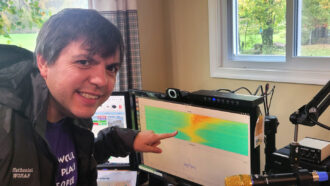array: A broad and organized group of objects. Sometimes they are instruments placed in a systematic fashion to collect information in a coordinated way. Other times, an array can refer to things that are laid out or displayed in a way that can make a broad range of related things, such as colors, visible at once. The term can even apply to a range of options or choices.
brain waves: Electrical signals produced through the coordinated activity of billions of nerve cells in the brain of an animal. When charted, the signal typically looks wavy or spiky.
clinical: (in medicine) A term that refers to diagnoses, treatments or experiments involving people.
colleague: Someone who works with another; a co-worker or team member.
culture: (n. in social science) The sum total of typical behaviors and social practices of a related group of people (such as a tribe or nation). Their culture includes their beliefs, values and the symbols that they accept and/or use. Culture is passed on from generation to generation through learning. Scientists once thought culture to be exclusive to humans. Now they recognize some other animals show signs of culture as well, including dolphins and primates.
current: (in electricity) The flow of electricity or the amount of charge moving through some material over a particular period of time.
diagnose: To analyze clues or symptoms in the search for their cause. The conclusion usually results in a diagnosis — identification of the causal problem or disease.
disorder: (in medicine) A condition where the body does not work appropriately, leading to what might be viewed as an illness. This term can sometimes be used interchangeably with disease.
electrode: A device that conducts electricity and is used to make contact with non-metal part of an electrical circuit, or that contacts something through which an electrical signal moves.
engineer: A person who uses science to solve problems. As a verb, to engineer means to design a device, material or process that will solve some problem or unmet need. (v.) To perform these tasks, or the name for a person who performs such tasks.
metal: Something that conducts electricity well, tends to be shiny (reflective) and malleable (meaning it can be reshaped with heat and not too much force or pressure).
range: The full extent or distribution of something. For instance, a plant or animal’s range is the area over which it naturally exists.
resistance: (in physics) Something that keeps a physical material (such as a block of wood, movement of electrons, or flow of water or air) from moving freely, usually because it provides friction to impede its motion.
solution: A liquid in which one chemical has been dissolved into another.
technology: The application of scientific knowledge for practical purposes, especially in industry — or the devices, processes and systems that result from those efforts.
wave: A disturbance or variation that travels through space and matter in a regular, oscillating fashion.









